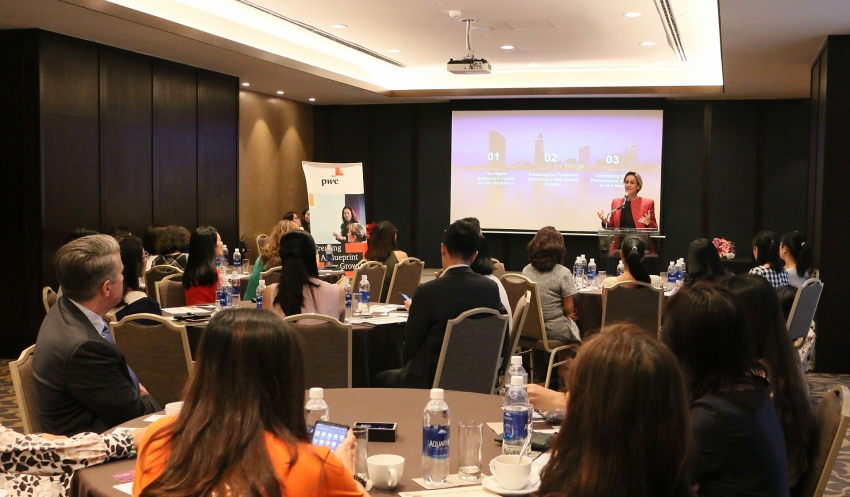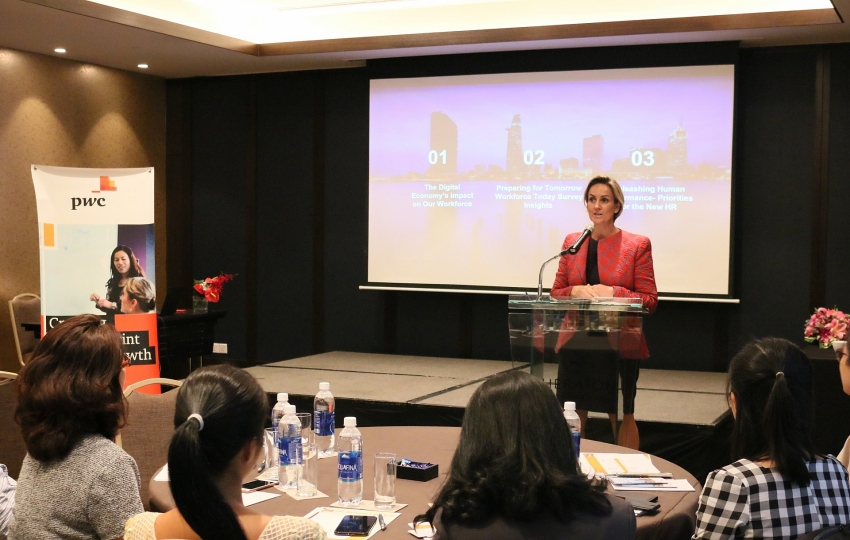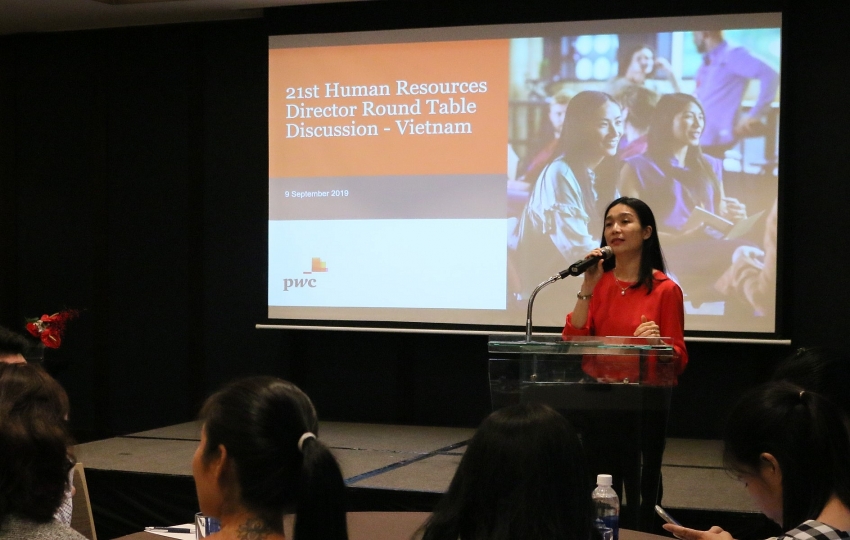PwC: Considerations for HR leaders in the new era of work
 |
| The PwC event held early this week in Ho Chi Minh City |
Preparing for tomorrow’s workforce
A new survey of over 22,000 adults across 11 economies released by PwC – a global assurance, advisory, tax, and legal services firm – finds that the speed of change brought by technology is pushing workers across the globe to adapt.
The majority of workers (61 per cent) are positive about the impact of technology on their day-to-day work and 77 per cent of people would learn new skills now or completely retrain to improve their future employability.
Yet the support they receive from employers is not up to par, according to PwC experts from Southeast Asia at the roundtable discussion with HR leaders of Vietnam-based firms.
Most businesses are failing to take the necessary actions to grow or add future-ready talents to their organisations, for example by using data analytics to make workforce decisions or creating a compelling work experience for employees.
Findings from PwC’s report titled Preparing for tomorrow’s workforce, today reinforce these statements. The 2018 report finds that although more than 70 per cent of survey respondents in Southeast Asia think using data analytics in workforce decisions is important, only 34 per cent actually do so.
Meanwhile, 68 per cent of respondents in the region view mobility as important, but only 44 per cent have effective mobility and collaboration programmes in place to make the best use of talent across borders.
 |
| Nicole Wakefield spoke with HR leaders in Ho Chi Minh City |
“Everywhere in the world, the future of the workforce will rely on highly-skilled workers. The situation in Vietnam is no exception,” said Nicole Wakefield, PwC’s Southeast Asia Management Consulting leader.
She added that employees and employers should think less about jobs and roles and more about the bundle of skills that they have and need in the digital world. It is this bundle of critical skills that will be the most important asset when setting up for success.
“Providing a culture of lifelong learning, upskilling, and growth mindset will be a priority for companies and their workforce. Learning will no longer be an activity that is only done once or twice a year in a formal classroom setting," Wakefield explained. “Rather, it will become a regular part of someone’s daily and weekly working journey as they continue to adapt and evolve.”
Spotlight on employment taxes
Upskilling and employee experience aside, employers should also pay due attention to the core obligations they have towards their workforce.
The term “employment tax” takes centre stage here. Employment tax can be understood as any obligation that an employer has in respect of its employees. Not only does it encompass paying employees on time, but it also includes fulfilling social security obligations and meeting regulatory requirements such as employment tax withholding, year-end reporting, as well as employee wellbeing, among others.
| According to the Paying Taxes 2019 report by PwC and the World Bank Group, globally, tax authorities are collecting as much employment tax as profit tax (corporate tax). The changing legislation landscape in Vietnam reflects this global trend. |
According to the Paying Taxes 2019 report by PwC and the World Bank Group, globally, tax authorities are collecting as much employment tax as profit tax (corporate tax).
The changing legislation landscape in Vietnam reflects this global trend. For example, effective from December 1, 2018, social insurance contributions are payable by foreign individuals working in Vietnam under employment contracts with an indefinite term or a definite term of one year or more.
With this change, employers must start making contributions for foreign employees at the relevant employer contribution rates.
Elsewhere in Southeast Asia, legislative and technological changes are also causing disruption. Other employment tax trends in the region include more aggressive and targeted tax audit activities using data analytics, focusing on payroll audits and employer obligations. Quicker access to information and collaboration amongst regulatory authorities are also on the rise.
 |
| Brittany Chong at the event |
“These trends and challenges warrant a greater focus on developing a comprehensive employment tax framework, focusing on acquiring the necessary tax expertise, tax engagement structure, and risk management. This framework should include an employment tax strategy that is aligned to the wider tax and business strategy,” said Brittany Chong, Global Mobility Services leader at PwC Vietnam.
Chong added: “Forward-looking HR leaders are well-advised to take a holistic view of all the aspects of maintaining a productive workforce. Digital upskilling has been the buzzword recently and it should indeed be a focus. However, that does not mean that companies can afford to neglect compliance obligations with regards to their employees.”
What the stars mean:
★ Poor ★ ★ Promising ★★★ Good ★★★★ Very good ★★★★★ Exceptional
Related Contents
Latest News
More News
- Vietnamese consumers express concern about climate change (October 11, 2025 | 14:06)
- ESG seen as key to Vietnam’s business credibility and capital attraction (September 29, 2025 | 18:38)
- From compliance to strategy: ESG criteria gaining ground (September 29, 2025 | 15:47)
- Vietnamese firms step up ESG game (September 23, 2025 | 15:26)
- Vietnam tax and legal changes set to shape foreign investment landscape (September 16, 2025 | 13:46)
- Vietnamese businesses navigate US tariffs (June 25, 2025 | 12:14)
- The impact of cloud, AI, and data on financial services (April 14, 2025 | 11:20)
- Vietnam 2025 M&A outlook: trends, deals, and opportunities (March 21, 2025 | 08:54)
- Vietnam's M&A landscape mirrors global trends (February 18, 2025 | 17:13)
- Asia-Pacific CEOs enter 2025 with optimism and caution (February 06, 2025 | 17:16)

 Tag:
Tag:
























 Mobile Version
Mobile Version